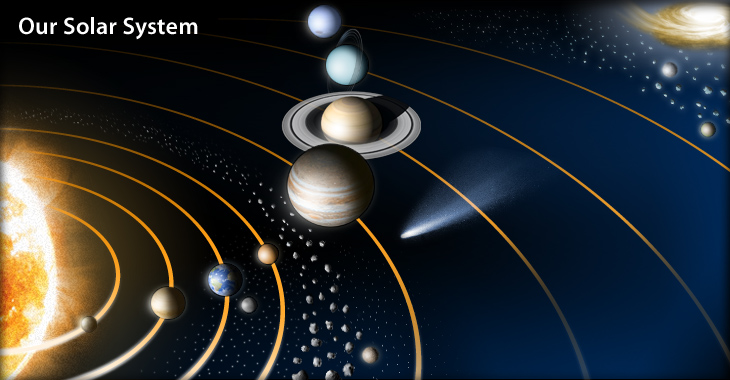There are eight planets in the solar system: Mercury, Venus, Earth, Mars, Jupiter, Saturn, Uranus, and Neptune. The four inner solar system planets (Mercury, Venus, Earth, and Mars) fall under the category of terrestrial planets; Jupiter and Saturn are gas giants (giant plants composed mostly of hydrogen and helium) while Uranus and Neptune are the ice giants (containing mainly elements heavier than hydrogen and helium).
Pluto, a dwarf planet, was classified as one of the solar system planets when it was first discovered by Clyde Tombaugh. However, it is now considered to be one of the largest known members of the Kuiper Belt — a collection of icy bodies on the outer fringes of the solar system. Pluto was demoted from its planetary status in 2006 when a body of scientists decided a formalized definition for the term “planet.”
According to the International Astronomical Union's definition, a planet is “a celestial body that (a) is in orbit around the Sun, (b) has sufficient mass for its self-gravity to overcome rigid body forces so that it assumes a hydrostatic equilibrium (nearly round) shape, and (c) has cleared the neighborhood around its orbit.” Because Pluto is part of the Kuiper Belt, and therefore has not met the third criterion, it is no longer considered a planet. Instead, it is classified as a dwarf planet. Other dwarf planets include Ceres, Haumea, Makemake, and Eris.
With an atmosphere, stark surface features, and at least five moons, Pluto is the most complex dwarf planet we know, and one of the most surprising solar system planets. New Horizons flew by our favorite dwarf planet in July 2015 and scientists continue to uncover surprising details about this faraway world.
Other Frequently Asked Questions About the Solar System:
- What are the smallest and largest planets in our solar system?
- Why do the outer, gas-giant planets rotate faster than the inner, terrestrial planets?
- What is a comet, and where do they come from?
- What are asteroids and where do they come from?
Find more answers to your questions in Sky & Telescope's Astronomy Q&As.
Now available: 6-inch globe of Pluto created using New Horizons imagery!
 0
0









Comments
You must be logged in to post a comment.